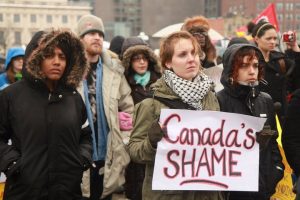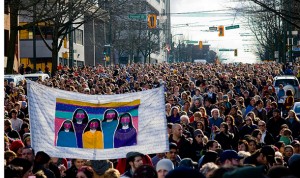The Missing and Murdered: A Week of Domestic and International (In)Action
A horrific but too often ignored situation in Canada received some very high profile attention this past month.
The Native Women’s Association of Canada (NWAC) and the Canadian Feminist Alliance for International Action (FAFIA) announced that the United Nations will be conducting an inquiry into the hundreds of murders and disappearances of Aboriginal women and girls in Canada.

But while that announcement was welcomed by many, another announcement in December wasn’t so warmly received.
The Standing Committee on The Status of Women released a report, Ending Violence Against Aboriginal Women and Girls: Empowerment – a New Beginning meant to address the problem.
The Standing Committee is a group within Canada’s parliament responsible for examining legislation, reports and departmental policies and programs related to women.
According to MP Irene Mathyssen (NDP) — the Standing Committee’s own chair — the report has been watered down by politics.
In March of 2011, the Standing Committee tabled an interim report in the House of Commons that involved testimony from more than 150 witnesses at hearings held in 14 communities across Canada.
At the time of those hearings, the Standing Committee was an intergovernmental group operating in a minority government. But that all changed when the Harper Conservatives took power.
Mathyssen says that major political shift meant major changes to the report. “New parameters were set and this included how much was spent in each of the areas,” she said. “The analyst could only go in and utilize what was said in connection with these new parameters. It wasn’t the report that we envisioned.”
Mathyssen says the framework of the interim report took into account the 580 pages of testimony from witnesses, a great deal of it outlining problems and offering solutions to violence against aboriginal women and girls.
“The second report is what the government wanted it to be. It was not what we heard, it was not what we promised,” Mathyssen says. “All they [the government] wanted to do was show that they invested money.”
Sharon McIvor is an Indigenous activist and academic involved with FAFIA. She says the Standing Committee’s second report was remarkably different. “In their interim report the Committee saw the issue of missing and murdered women as a pressing issue. They really backed off from that.”
A total of nine recommendations were made in the new report but McIvor says all of them fell short. “None of them were very comprehensive and the last one was very disturbing as it said, ‘Should funds become available, this is what we’ll do.'”
It was McIvor that appeared (with NWAC) before the UN Committee on the Elimination of Discrimination against Women (CEDAW) in 2008 to request they pursue an inquiry under the Convention’s Optional Protocol.
“When you have a body like the UN getting involved in an issue, I think it is because they came to the conclusion that things are not proceeding in the way that they should in a certain country,” says Claudette Dumont Smith, Executive Director with the Native Women’s Association of Canada.

“They will leave no stones uncovered, and by the end of the day they will provide the recommendations needed to change the status quo.”
McIvor agrees that changes are needed.
“We have a colonial history which has had an impact on the place of aboriginal women in Canada,” she says.
“Men know they can prey on Indian women and no one is going to hold them responsible and we know that. We’ve got 600 plus missing and murdered and very few people have been held accountable,” added McIvor.
McIvor and others often cite the situation in Mexico (where the UN conducted a similar inquiry) as comparable to Canada.
In 2004, CEDAW concluded its first inquiry into the abduction, rape and murder of Indigenous women in the Ciudad Juarez area of Chihuahua, Mexico.
“The inquiry had really highlighted the problem [in Mexico],” says McIvor. “They identified systematic problems and the policing was a systematic problem. I suspect that when they come into Canada we’ll get the same kind of report and Canada cannot turn a blind eye to it.”
Although the inquiry itself will be confidential, McIvor says it was important for NWAC and FAFIA to go public with their announcement. “First, to let people know there will be [an inquiry] happening. Two, to try to get people organized so that when the inquiry does come, we can make sure that the inquiry hears from people other than the government sources.”
But if the Canadian government is in any way concerned about the UN inquiry, they’re certainly not showing it. There has been no official response, and Status of Women Minister Rona Ambrose was unavailable for comment after numerous attempts were made to contact her.


http://www.missingnativewomen.org/